Benjamin James Nunns: Murder trial begins for man accused of close-range shooting
An accused murderer’s mental health has been scrutinised as his lawyers argue his diminished capacity reduced his culpability in the shooting death of a man outside his Warwick home.
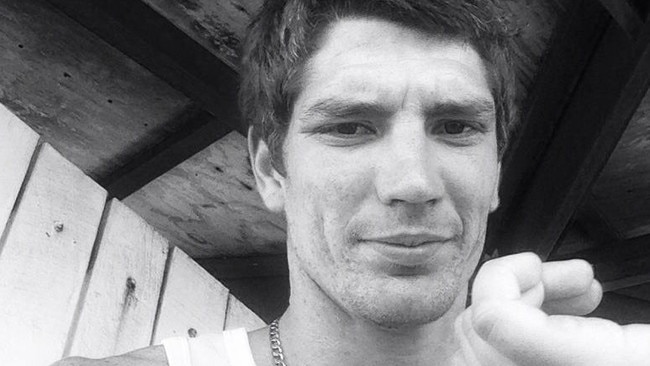
Police & Courts
Don't miss out on the headlines from Police & Courts. Followed categories will be added to My News.
The jury is expected to retire Friday to consider its verdict in the Toowoomba Supreme Court murder trial of Benjamin James Nunns.
The jury is expected to retire Friday to consider its verdict in the Toowoomba Supreme Court murder trial of Benjamin James Nunns.
The 34-year-old man is accused of shooting Charles Compton in the neck during a disturbance at his Warwick home in the early hours of April 5, 2020.
Both the defence and the Crown concede that Mr Nunns fired the fatal shot, but he has pleaded not guilty to murder, and guilty instead to manslaughter by way of diminished capacity.
The plea was rejected by the Crown.
Over two weeks, defence barrister Scott Lynch has argued that his client was suffering from a psychotic episode linked to undiagnosed schizophrenia.
Mr Lynch pointed to Mr Nunns’ history of bizarre, paranoid behaviour in the year leading up to the shooting.
This included allegedly hearing the voice of his long-dead stepfather, believing crickets, geckos and flashing lights were trying to communicate with him, that a syndicate of drug dealers wanted to do him harm, and that the police were secretly working with him to eliminate undesirables from the Warwick area.
The jury heard that on the day of the shooting, Mr Nunns found two cricket bats and believed one contained a message indicating which families would survive the end of the world.
About 11pm on April 4, Mr Nunns is alleged to have invited Mr Compton and his wife Karen O’Halloran over to his house to inspect the bat.
What happened next has remained unclear through the trial, but according to the accounts from Mr Nunns, Ms O’Halloran and Mr Nunns’ ex-partner Ambre Lanais, the two men smoked meth in Mr Nunns’ shed until about 4am on April 5, while Mr Nunns attempted to fashion a bulletproof vest from a baby capsule.
Ms O’Halloran told the jury that the couple wanted to go to McDonald’s and it was later revealed by Mr Nunns that he thought Mr Compton was attempting to lure him to a storage unit where he would be “knocked off”.
As a result of this belief Mr Nunns told the jury he armed himself with a metal pole and hit Mr Compton “two or three times”.
The jury was shown evidence that there was enough force in these blows to break Mr Compton’s arm.
The jury heard that Mr Compton fled to his vehicle that was parked in the driveway, while Mr Nunns went into his house and retrieved a .22 bolt action rifle.
He is then alleged to have fired a warning shot, before walking up to the vehicle and firing a second shot through the windscreen, hitting Mr Compton’s neck and killing him.
In his closing address, Mr Lynch reminded the jury of the evidence of three psychologists who assessed Mr Nunns in the aftermath, all of whom said he suffered from paranoid delusions.
“Remember what the doctors said about, ‘the fear is genuine, it is real in their life’,” Mr Lynch said.
Crown prosecutor Matt Le Grand sought to downplay the alleged mental illness, suggesting it was fabrication after the fact, and that the psychosis was drug-induced.
He told the jury that Mr Nunns’ actions were not those of a man who feared for his life.
“Even if he had a mental illness, his actions were so far from reasonable,” he said.
“There was clear evidence from Ms O’Halloran that there was not a threat – Mr Compton wanted to take them to McDonald’s to get a meal.
“At no point was Mr Compton armed, but Mr Nunns was throughout.
“He has obtained a more serious weapon, to what? Only scare them off after they were already retreating.
“He did not stay in his home, not to seek refuge, but to upgrade his firepower, while Charlie was retreating.
“His actions are far more consistent with continuing his attack on Charlie, rather than being scared.”
The trial before Justice Martin Burns continues.
DAY 6: Accused killer’s doctor grilled during murder trial
A jury has heard voices inside Benjamin James Nunns’ head told him a drug syndicate was out to get them, that Charles Compton meant to do him harm and that he should run.
But a court has been told they did not tell him to bash Mr Compton in the head or retrieve a .22 bolt-action rifle hidden in the ceiling of his Warwick home and shoot the 38-year-old ice user in the neck, killing him about 5am on April 5, 2020.
It is alleged that after shooting Mr Compton, Mr Nunns, 34, dismantled the rifle and hid the parts in a nearby property, including climbing a roof and dropping the firing pin down a chimney.
This account was revealed by one of Mr Nunns’ psychiatrists during the sixth day of Mr Nunns’ trial for murder in Toowoomba Supreme Court
That Mr Nunns shot and killed Mr Compton is not at question, rather the jury has been tasked with deciding on his capacity to make decisions after the defence entered a plea of guilty to manslaughter by way of diminished capacity.
This plea was rejected by the Crown.
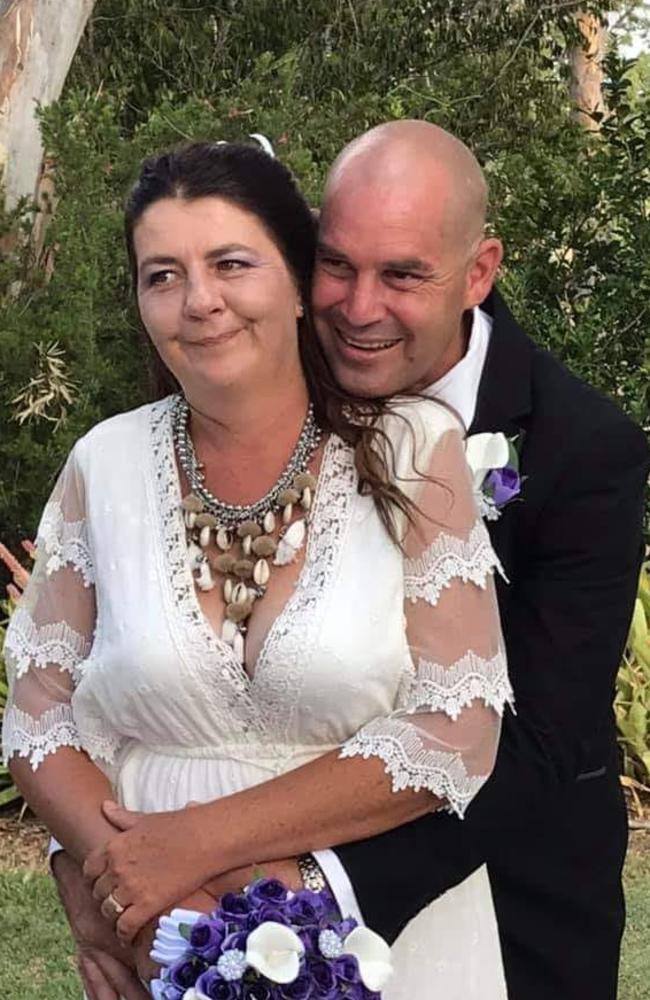
Now in its second week, the trial has heard from several witnesses including the accused Mr Nunns, his partner at the time of the shooting Ambre Lanais, the wife of the deceased Karen Compton, and several police officers.
On Tuesday it heard from Dr Jane Helen Phillips, a forensic psychiatrist who assessed Mr Nunns in the weeks after the shooting.
Dr Phillips told the jury that she used a range of sources to arrive at a schizophrenia diagnosis, including a four hour-interview with Mr Nunns, interviews with his family, an assessment of his family’s mental health history, recordings of his interaction with police after his arrest and the notes of several doctors who observed Mr Nunns while he was a patient at The Park, a secure mental health hospital in Brisbane.
Dr Phillips said that it was likely Mr Nunns’ illness was brought on by his methamphetamine use and that he showed two of the five indicators needed for a diagnosis – namely delusions and hallucinations.
The jury heard Mr Nunns believed his long-dead stepfather was talking to him and had left a message inside two cricket bats about who would survive the end of the world. Dr Phillips said Mr Nunns had disclosed a persecutory delusion that a syndicate of drug dealers were out to get him and the crickets, flashing lights and the colours of certain houses were clues as to who was or was not against him.
“He would ask a question to the lights, and depending on how the lights flicked that would be the response,” she said.
The court was told that in response to these false threats, Mr Nunns hoarded a large collection of knives and a rifle, and fortified his home with an excessive number of locks, alarms and CCTV.
Dr Phillips told the court that some of Mr Nunns symptoms were on display in the police interviews after his arrest, but it did not appear as though he was hearing voices.
Under cross examination, Crown prosecutor Matt Le Grand asked if it were possible that the symptoms were the result of drug-induced psychosis, to which Dr Phillips said they could be.
But she added that if it was drug-induced psychosis, then the symptoms would have dissipated after he sobered up.
“I don’t think you can characterise his illness as a drug induced psychosis. He had schizophrenia that was exacerbated by methamphetamine use and methamphetamine intoxication,” she said.
“I am basing it on Mr Nunns self-reporting and the assessment of three doctors who observed him in the secure unit.”
Dr Phillips said Mr Nunns was likely to have been suffering from schizophrenia for several years and pointed to an incident in 2014 when he presented to Ipswich Police Station, reporting that separate syndicates of drug dealers from Warwick and Stanthorpe were trying to kill him.
At the time, the police called in the services of a mental health clinician who assessed Mr Nunns at the police station, but no further action was taken.
“I do question the wisdom of why he was not transported for an assessment at that time,” Dr Phillips said.
Mr Le Grand questioned Dr Phillips about the nature of Mr Nunns’ “fixed false beliefs” about the syndicate being out to get him, about the crickets and flashing lights warning him to flee.
“Is it significant to your assessment of him that those hallucinations were not commanding him to attack Mr Compton or get a gun,” Mr Le Grand said.
“Mr Nunns has been consistent with me and, and I think with all his psychiatrists, that there had not been any voices telling him to get the gun or harm Mr Compton,” Dr Phillips said.
Mr Phillips added that Mr Nunns told her his attempts to dispose of the rifle and hide just a few minutes after the shooting as a result of commands from the voices in his head.
The trial before Justice Martin Burns continues.
DAY 5: Psychiatrist’s diagnosis put to the test during murder trial
The fifth day of Benjamin James Nunns’ trial for murder has heard testimony from a psychiatrist who was questioned over the symptoms the 34-year-old had two weeks after he shot a man.
Dr Kailash Kedia from The Park Secure Mental Health Hospital told a jury that he diagnosed Mr Nunns with schizoaffective disorder in the weeks after he shot and killed Charles Compton outside his Warwick home on April 5, 2020.
Mr Nunns is charged with murder and initially entered a plea of guilty to manslaughter by way of diminished capacity, but this plea was rejected by the Crown.
Both the defence and Crown conceded that Mr Nunns shot Mr Compton with a .22 bolt action rifle about 4am, after the pair had been smoking ice in Mr Nunns’ shed at 50 Glen Rd, Warwick.
He was arrested a short time later, in a nearby address after allegedly dismantling the rifle and hiding the parts in several locations, including dropping the firing pin down a chimney.
Mr Nunns gave evidence earlier in the trial in Toowoomba Supreme Court, telling the jury that he heard voices in the weeks leading up to the shooting, that he thought crickets and geckos were sending him signals and that Mr Compton was attempting to lure him to a storage shed to kill him.
Included in his list of delusions was the idea that his stepfather had left a message for him inside an old cricket bat.
He added that he was paranoid and had fortified his home with screamer alarms, locks on every door and CCTV cameras.
Under cross examination by Crown prosecutor Matt Le Grand, Dr Kedia was asked whether Mr Nunns’ paranoia might be the result of regular methamphetamine use and not a medical disorder.
Dr Kedia rejected the suggestion and said Mr Nunns’ behaviour was excessive.
Mr Le Grand then referred to Mr Nunns efforts to dispose of the rifle, alleging it was evidence of someone who has presence of mind.
Again, Dr Kedia rejected this suggestion.
“Mr Nunns had some level of presence of mind, but if he was in his right mind, he might have displayed better planning,” he said.
Mr Le Grand went on to question the timing of Mr Nunns’ disclosures about hearing voices and receiving suggestions from crickets. He alleged this was something Mr Nunns fabricated after learning about the symptoms of schizophrenia while at The Park, a secure mental health hospital that Mr Nunns was moved to within two weeks of the shooting.
Mr Le Grand referenced the inconsistencies with Mr Nunns’ initial police interviews and his later disclosure to his doctors.
“Mr Nunns does not speak to police about crickets, instead he talks about having feelings of the world ending. He does not mention the writing on the cricket bat,” Mr Le Grand put to Dr Kedia.
Dr Kedia replied that it was common for mentally ill people to withhold information.
“It might not be easy for patients to be open about those experiences, someone would need some kind of alliance to access that type of information,” he said.
Dr Kedia went on to say that some of the symptoms Mr Nunns exhibited in the days before and after his arrest – such as hearing voices, having broken and confused speech, hallucinations and paranoia – may be the result of methamphetamine use, but if that was case then the symptoms would subside when he sobered up.
“If the symptoms persist even after stopping the drug use, it cannot be attributed to drug use,” Dr Kedia said.
“I don’t think there was a resolution of symptoms, I think the symptoms persisted.”
The trial before Judge Martin Burns is expected to run all week and hear from more expert medical witnesses in the coming days.
DAY 4: ‘Clearly angry’: Crown seeks to discredit alleged killer’s claim he was hearing voices
The Crown has sought to discredit an accused murderer’s claim that he was hearing voices when he shot a drug user at close range and killed him.
Benjamin James Nunns is on trial in Toowoomba Supreme Court, charged with murder. On Tuesday he pleaded not guilty to the offence, offering instead to plead guilty to manslaughter by way of diminished capacity.
This plea was rejected by the Crown.
It is alleged Mr Nunns, Charles Compton and Karen Compton were smoking ice in the shed at his Glen Road home in Warwick on April 5, 2020.
The jury heard from Ms Compton on the first day of the trial that the trio had intended to go to McDonald’s for food about 4am when Mr Nunns attacked Mr Compton, bashing him in the head with a metal pole several times before shooting him in the neck with a bolt-action .22 rifle.
The jury heard both the Crown and Mr Nunn’s lawyers concede he shot and killed Mr Compton.
The defence case, led by barrister Scott Lynch, has maintained Mr Nunns was suffering from paranoid delusions in the years leading up the incident.
They included hearing the voice of his long-dead stepfather, believing that crickets and geckos were sending him signals and that the colours of certain houses’ roofs were the clues to whether ‘good’ or ‘bad’ people lived inside, that he thought the world was ending.
During a video recording of Mr Nunns’ initial police interview after his arrest, the jury heard him say he thought Mr Compton wanted to take him to a storage unit and ‘knock him off’ and this was why he attacked him.
Mr Nunns took the stand on Thursday and Friday where he was grilled during cross examination by Crown Prosecutor Matt Le Grand.
Mr Le Grand put it to Mr Nunns that he never heard crickets or geckos talk to him, nor the voice of his dead stepfather, but rather these were symptoms of schizophrenia that he learned from other inmates while being held on remand in a secure mental health unit.
Mr Nunns denied this claim.
Mr Le Grand pointed to the inconsistencies in Mr Nunns’ police interviews, his later testimony and the evidence provided by his partner at the time of the shooting.
“You never told police in the various interviews that you heard crickets, about civil war and the world ending,” he said.
“Are they all things that you thought to add to your case afterwards?”
Mr Nunns denied the claims.
Mr Le Grand then pressed Mr Nunns on his claim that he was trying to scare Mr Compton off his property
“You did get the rifle, you did not run away,” he said
“But that was what the crickets were telling you, they were telling you to get away.
“If you were trying to shoot to scare him away, why didn’t you shoot into the air?
“You were clearly angry with Charlie Compton, which is why you bashed him with a pole, shot into the driver’s seat and continued to bash on the car,” he said.
Mr Nunns rejected this claim.
The trial before Judge Martin Burns is expected to hear three expert witnesses on Monday and Tuesday who will address Mr Nunns mental state.
DAY 3: Phone hacks, the Illuminati and message hidden in a bat: Alleged murderer’s bizarre observations
Video evidence played to the jury in the murder trial of Benjamin James Nunns showed a man who was tired, rambling and incoherent.
The 34-year-old man is accused of murdering Charles Compton by shooting him in the neck outside Mr Nunns’ Glen Rd home in Warwick in the early hours of April 30, 2020.
When arraigned Mr Nunns pleaded not guilty to murder and guilty to manslaughter by way of diminished capacity.
This alternate plea was rejected by the Crown.
On day three of the trial, the jury was shown several pieces of video evidence including three recordings of interviews with detectives in the hours after Mr Compton was shot and killed, and CCTV vision from inside Mr Nunns’ home in the immediate aftermath.
During the police interview Mr Nunns appeared to co-operate with police by admitting to shooting Mr Compton.
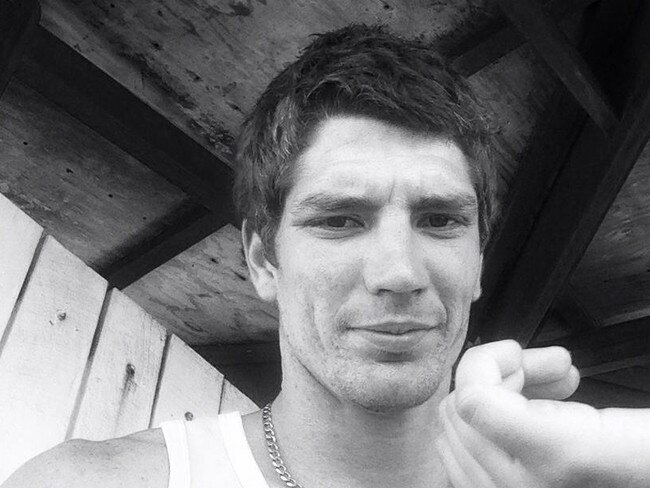
However he outlines the sequence of bizarre observations in the lead-up to the shooting at 4am.
They include that he thought his phone had been hacked, that he was being sent information by the Illuminati and that someone had hidden a message inside a cricket bat that belonged to his deceased stepfather.
Mr Nunns told the arresting officer that he invited Mr Compton to his house to show him the cricket bat and its hidden message about 10pm on April 4, 2020.
He went on to say that Mr Compton brought over some ice that “was pretty keen” for Mr Nunns and later offered to give Mr Nunns several “points” despite his insistence that he did not want any.
Mr Nunns told the arresting office that he thought Mr Compton was using the promise of more drugs to lure him to a storage container where he would be “knocked off”.
“It was pretty clear in my mind that they were trying to take me to this shed and do something horrible to me,” he said to the arresting officer.
He went on to say that he feared for his life and started to make a protective vest from the components of a baby’s stroller.
Mr Nunns told police that Mr and Ms Compton became increasingly agitated when he refused to leave the property with them.
He told police that he bashed Mr Compton on the head several times with a pole after Mr Compton tried to direct him into this vehicle.
The jury heard that Mr and Ms Compton fled to their vehicle that was parked in Mr Nunns’ driveway, while he went inside his home, woke his partner Ambre Lanais, and armed himself with a .22 bolt action rifle that he illegally purchased about six months earlier.
Mr Nunn told police that he confronted Mr Compton – who was in the driver’s seat of his vehicle at this point – telling him to get off his property, before firing through the driver’s side window.
The jury heard the shot punctured Mr Compton’s neck and he bled out in the vehicle.
Towards the end of the interview Mr Nunns said he ran from his property and felt like he was being led to a specific house in his neighbourhood, where there was a ladder positioned against it that gave him access to the roof.
He also said there was a change of clothes that had been left out for him.
“There was everything there I needed to look after myself.” he said.
He was arrested a short time later at a nearby address.
The Crown closed its case on Thursday and the defence is expected to call on several medical experts who will speak to Mr Nunns alleged diminished capacity.
The trial continues before Justice Martin Burns.
DAY 2: ‘We lived in fear’: Murder accused fortified home as Covid took hold
Benjamin James Nunns was allegedly trapped in a world of paranoia in the years leading up to April 5, 2020 when he shot and killed Charles Compton, a jury has heard.
While giving evidence at Mr Nunn’s trial for murder, his ex-partner Amber Lanais, said they had installed locks on every door of their Warwick home, screamer alarms on every window and ringed the property with security cameras.
“For five years we lived in fear for our lives,” she said.
Under cross-examination by defence barrister Scott Lynch, Ms Lanais outlined how Mr Nunn’s paranoia escalated in the last five years of their relations.
She told the Toowoomba Supreme Court the 34-year-old thought crickets and geckos were sending him signals, that he was hearing the voice of his long-dead stepfather and the police were sending him information about ‘bad people’ in the community that he was to eliminate.
“The whole time I have known Ben he has been quite paranoid,” Ms Lanais said.
“It was a constant thing.”
Ms Lanais told the court Mr Nunns would often discuss how the colour of a roof was a sign that either a good or bad person lived in a particular house, and that anyone wearing camo-style clothing was out to get him.
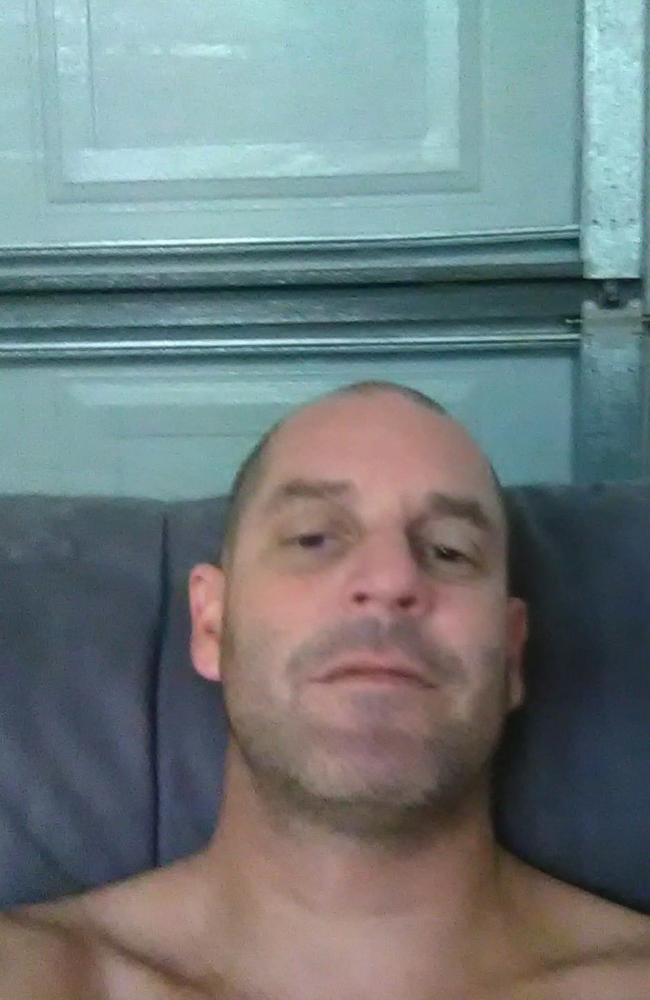
She told the court she made a point of only wearing ‘safe’ colours while he was around.
The court heard in the week leading up to the shooting Mr Nunns picked up some Chinese takeaway and upon learning that it was the wrong order, he believed the food was provided by the police who were sending him a message.
She added his paranoia escalated with the start of the Covid pandemic.
“He was talking about how the world was ending.”
Mr Nunns is alleged to have shot Mr Compton in the neck with a bolt-action .22 rifle at close range about 4am on April 5, 2020.
It is alleged the shooting occurred after the men, and Mr Compton’s wife Karen, were drinking and smoking ice in Mr Nunns’ shed.
Mr Nunns pleaded not guilty to murder, offering instead to plead guilty to manslaughter by way of diminished capacity.
This plea was rejected by the Crown and the matter has proceeded to trial in front of Justice Martin Burns and a jury.
Under cross examination by Mr Lynch, Ms Lanais said she had known Mr Nunns since he was 17 and that he rarely consumed drugs and or alcohol as he was fearful someone, would use the substances to poison him.
She added that despite his increasing paranoia, it was only in the days prior to the shooting that he contemplated getting medical help.
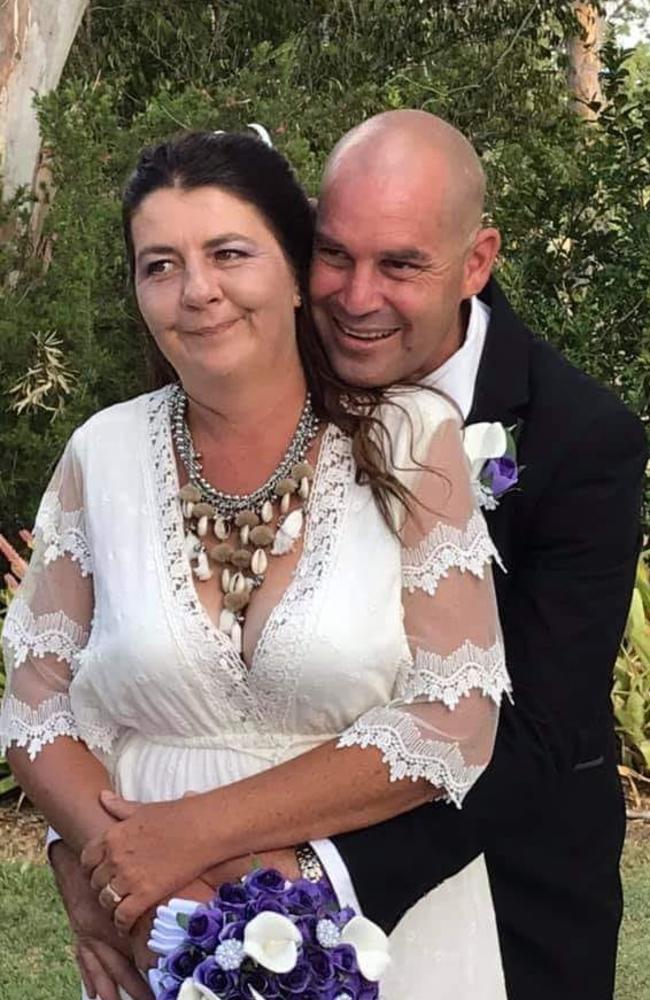
“In the last week before he went into custody, he said, ‘I think I need help’,” Mr Lanais said.
“He was so scared and his brain was so overwhelmed.”
In the hours before the shooting Mr and Ms Compton attended the Glen Rd home allegedly on Mr Nunns’ invitation and the trio were socialising in a shed for about four hours.
Ms Lanais was home then but told the court she was only with the trio for about an hour, when she saw Mr and Ms Compton smoke ice and drink, while Mr Nunns was busy with a baby capsule.
She told the court that Mr Nunns was attempting to convert the capsule into a bulletproof vest.
At about 3.30am on April 5, 2020, Mr and Mrs Compton said they wanted to get some McDonald’s and went to their vehicle.
The court was told Mr Nunns lingered in the shed for about 10 minutes leading Mr Compton to walk back to check on him.
Ms Compton gave evidence on the first day of the trial and said she went to follow Mr Compton after he too failed to return.
She said she saw Mr Compton on the ground and Mr Nunns standing near him with a firearm.
Mr and Mrs Compton ran to their car and she told the court she recalled hearing a gunshot.
When inside the vehicle, Ms Compton said she saw Mr Nunns bash on the windscreen before he shot Mr Compton through the driver’s side window.
“At that time he was bleeding, I didn’t know how bad Charlie was,” she said.
“I was screaming hysterically, I did not know what to do.”
Both the Crown and the defence have conceded Mr Nunns shot and killed Mr Compton.
It is alleged Mr Nunns fled to nearby property after the shooting and disposed of the rifle, before breaking into a second home where he was arrested.
Under re-examination by Crown prosecutor Matt Le Grand, Ms Lanais said Mr Nunns was a devoted father to his four children and would help with house and care duties.
This care continued as he has been held on remand for the past four years.
“We co-parent,” Ms Lanais said
“We have two children together and he speaks to the children regularly.”
The trial before Judge Martin Burns continues.
DAY 1: Man bashed with pole before being shot dead in ‘paranoid’ attack
A Crown Prosecutor alleged Benjamin James Nunns was in the throes of paranoia when he shot Charles Compton in the neck at close range, killing him.
Mr Nunn’s actions led to a swift arrest and a charge of murder to which he pleaded not guilty in the Toowoomba Supreme Court on Tuesday.
The 34-year-old Warwick man instead pleaded guilty to manslaughter by way of diminished capacity.
The Crown did not accept this plea.
A jury of six men and six women was empaneled to find a verdict on the murder charge at a trial that is expected to run until at least next week.
During his opening remarks, Crown Prosecutor Matt Le Grand told the jury Mr Compton and his partner Karen were invited to Mr Nunn’s Glen Road home in Warwick in the evening of April 4, 2020 and that the trio consumed alcohol and methamphetamine in a shed at the rear of the property.
The Crown alleged at about 3.30am on April 5, the Comptons signalled their intention to drive to McDonald’s for food which triggered Mr Nunn’s paranoia.
Ms Compton went to their vehicle, which was parked at the front of the property.
Unknown to her at the time, Mr Nunns is alleged to have taken a pole and bashed Mr Compton in the head several times.
Mr Le Grand further alleged Mr Nunns armed himself with a bolt action .22 rifle and fired one shot at Mr Compton as he ran down the side of the property and jumped into the driver’s seat of this vehicle.
The jury was told Mr Nunns approached the car, struck the windscreen with the butt of the rifle then fired a shot at Mr Compton.
GUNSHOT SEVERED MAN’S JUGULAR, COURT TOLD
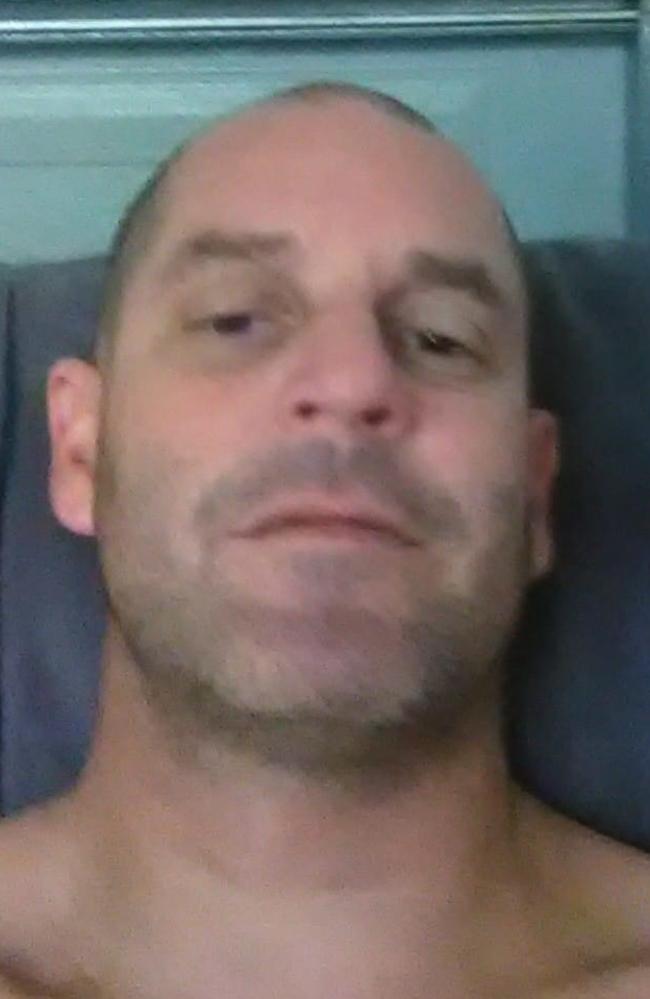
“Where the first round failed to hit anyone, the second succeeded,” Mr Le Grand said.
“The round severed Mr Compton’s jugular and he died soon after.”
It is alleged that Mr Nunns then fled to a nearby property, dismantled the rifle, hiding the stock at the rear of a property and dropping the bolt down a chimney.
He then allegedly broke into a second home where he was located by the occupants and later arrested by Warwick police.
Meanwhile, Mr Compton bled out in his car and was found dead at 4am.
Mr Le Grand said the jury would be asked to decide what Mr Nunns’ mental capacity was at the time of the shooting.
‘CASE ALL ABOUT STATE OF MIND’
“This is not a who-done-it case,” he said
“There is not really any doubt that the defendant shot Mr Compton, it is about what state of mind he was in at the time.”
Mr Le Grand alleged while Mr Nunns did not have detailed plans prior to the incident, his actions did indicate that he had intent to cause Mr Compton grievous bodily harm or to kill him.
“The concept of intent is distinguished from premeditation,” he said.
“The defendant started the assault with a pole, he used the pole to hit Mr Compton in the head several times.
“He upgraded his attack and fired two shots.
“The second shot was fired into the driver’s seat that he knew Charles was sitting in.
“It is an intent formed in the defendant’s increasing paranoia.”
Defence barrister Scott Lynch agreed the issue is not that Mr Nunn’s shot Mr Compton but whether he had an “abnormality of mind” unrelated to his level of intoxication.
“There will be evidence from the Crown to identify some of those issues, you might think there was not a great deal of alcohol or drugs consumed,” he said.
Mr Lynch said the jury may find doubt in the evidence given by Mr Nunn’s now-ex partner who observed strange behaviour in the days leading up to the shooting.
He also suggested the police interviews conducted in the days after the shooting show signs of a man who is confused and rambling, casting further doubt on his soundness of mind.
The jury will hear from up to a dozen witnesses including several neighbours, the partners of Mr Compton and Mr Nunns, police and several medical and psychiatric experts.
The trial before Justice Martin Burns continues.





